Gender, Whiteness, and Power in Rodeo
Gender, Whiteness, and Power in Rodeo
Breaking Away from the Ties of Sexism and Racism
Tracey Owens Patton & Sally M. Schedlock
Lexington Books
Lanham Boulder New York Toronto Plymouth, UK
Published by Lexington Books
A wholly owned subsidiary of The Rowman & Littlefield Publishing Group, Inc.
4501 Forbes Boulevard, Suite 200, Lanham, Maryland 20706
www.rowman.com
10 Thornbury Road, Plymouth PL6 7PP, United Kingdom
Copyright 2012 by Lexington Books
All rights reserved . No part of this book may be reproduced in any form or by any electronic or mechanical means, including information storage and retrieval systems, without written permission from the publisher, except by a reviewer who may quote passages in a review.
British Library Cataloguing in Publication Information Available
Library of Congress Cataloging-in-Publication Data
Patton, Tracey Owens.
Gender, Whiteness, and power in rodeo : breaking away from the ties of sexism and racism / by Tracey Owens Patton & Sally M. Schedlock.
p. cm.
ISBN 978-0-7391-7320-6 (cloth : alk. paper) ISBN 978-0-7391-7321-3 (electronic)
1. RodeosSocial aspectsWest (U.S.) 2. Women rodeo performersWest (U.S.) 3. CowgirlsWest (U.S.)Social conditions. 4. Discrimination in sportsUnited States. 5. Sex discrimination in sportsUnited States. 6. West (U.S.)Social conditions. I. Schedlock, Sally M. II. Title.
GV1834.5.P38 2012
791.8'40978dc23 2012018800
 The paper used in this publication meets the minimum requirements of American National Standard for Information SciencesPermanence of Paper for Printed Library Materials, ANSI/NISO Z39.48-1992.
The paper used in this publication meets the minimum requirements of American National Standard for Information SciencesPermanence of Paper for Printed Library Materials, ANSI/NISO Z39.48-1992.
Printed in the United States of America
Bonanza Jellybean in Even Cowgirls Get the Blues reminisced on the birth of her dream of becoming a cowgirl:
I saw my first cowgirl in a Sears catalogue. I was three. Up until then I had only heard of cowboys. I said, Mama, Daddy, thats what I want Santa Claus to bring me.... [Then] they let you dress up like a cowgirl, and when you say, Im gonna be a cowgirl when I grow up, they laugh and say, Aint she cute. Then one day they tell you, Look honey, cowgirls are only play. You cant really be one. And thats when I holler, Wait a minute! Hold on! Santa Claus and the Easter Bunny, I understand; they were nice lies and I dont blame you for them. But now youre screwing around with my personal identity, with my plans for the future. What do you mean I cant be a cowgirl?
1. Tom Robbins, Even Cowgirls Get the Blues (New York, NY: Bantam Books, 1976), 126.

Preface
Straight Out of the Gate: Why Study Rodeo?
When I was a little girl, in the mid-1950s, I wanted more than anything to be a cowgirl. It wasnt until quite recently that this ambition struck me as strange. A cowgirl? There wasnt a cow within miles of my place. I lived in the city, and the field across the street was not a pasture but an airport runway. As for the horses, the wooden steeds on a merry-go-round were wild enough for me. And yet, in my happiest moments, I was queen of the open range.
Being a cowgirl was a lot more fun than being a little lady, which was what my parents seemed to want of me. Little ladies wore white gloves to churches and had tea parties with their dolls.... But cowgirls dressed in shirts and jeans and ran around with the boys. They shot cap guns and yelled and made all kinds of noise. Bang! Bang! I got you. Youre dead. No, I am not. You missed. That was the life!
Fact was, if I could have managed it, I would have liked to be a cow boy. I was not sorry to be female, but I could see that being male had certain advantages.... All the boys in the neighborhood had their own [guns], but my parents wouldnt let me have any.... It was clear to me that I had no guns of my own because I was a girl. It wasnt fair. Just like it wasnt fair that Roy Rogers hogged most of the action on TV, and Dale Evans hardly got to do anything. Nobody ever sent Roy Rogers to the cafe for sandwiches.
The lure of cowgirls and cowboys has hooked the American imagination with the lure of freedom, a lack of gender bias, and adventure since the turn of the twentieth century. The cowboy and cowgirl played in the imagination and made rodeo into a symbolic representation of the Western United States. As a sport that is emblematic with all things Western, rodeo is a phenomenon that has since transcended into popular culture. Rodeos attraction has even spanned oceans and lives in the imaginations of many around the world. From the modest start of this fantastic sport in open fields to celebrate the end of a long cattle drive or to settle a friendly whos the best bet between neighboring ranches, rodeo truly has grown into an edge-of-the-seat, money-drawing, and crowd-cheering favorite pastime. Many little girls wish to grow up to become the fairy-tale princess-come-true as a rodeo queen, and many little boys dream of cowboying their way to fame as the bull rider or bronc rider. The interest in and love affair with this sport even extend from the youth of today to their parents, the media, and music. The pull of this sport reaches far and wide across the world. And the pull of rodeo drew us in, as well.
Rodeos inception in the late 1800s created an American pastime that fostered the idea of Manifest Destiny through taming the wild and focusing on the celebration of a simpler time of the past before modern technology spread across the nation. Rodeo focuses on the premise of the Code of the West, where the men place themselves in danger and keep the women safe from all events that may harm them. The cowboy and cowgirl are part of Americas past and have ridden into Americas present to set a stage of created history. The definition of cowboy and cowgirl since rodeos creation has been one that both the rodeo community and scholars have worked to establish. The search continues for a definition of these dynamic people as they encompass the many different facets of ranch, rodeo, and Western life. In truth, the idealism of cowgirls and cowboys is mostly tied to that of the White contestants, and the colorful history that encompassed ethnic minority women and men of rodeo moved to the back of the story. The exploration of the rodeo culture and norms merged, and with two authors unique backgrounds, the search for the cultivation of both the White and ethnic minority cowgirl and cowboy participants begins.
As authors we could not be more different from one another in terms of life experiences and background, yet we bring complementary strengths, abilities, and knowledge to this project. As luck would have it, we both happened to be in Wyoming at the same time. As a Colorado native who spent time living in Europe, Patton was familiar with the lure of rodeo in the West and such entities as the Pro Rodeo Hall of Fame. She knew of rodeo, but became more interested in rodeo once she accepted a job at the University of Wyoming. As a city kid who is considered an outsider to rodeo culture, it was obvious to her that rodeo culture is palpable in Wyoming. Rodeo is an active and vibrant part of Wyoming culture. The pulse of rodeo is everywhere in the Cowboy state, and clearly demonstrated by the support the university provides to the rodeo team and by the world-famous Cheyenne Frontier Days, The Big Daddy of Em All, just a 45-minute drive from the university. Pattons insiders perspective to rodeo began when she read about the cowgirl and rodeo cultures through co-author Sally Schedlocks experiences and lens. As a critical cultural communication and rhetorical studies scholar, who, among other things, conducts research about other cultures and people and the interdependence of race, gender, and power upon communication, she was fascinated by the intercultural foundations of the sport we now term rodeo.

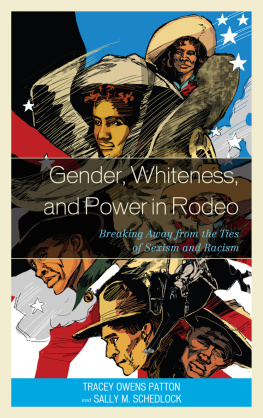
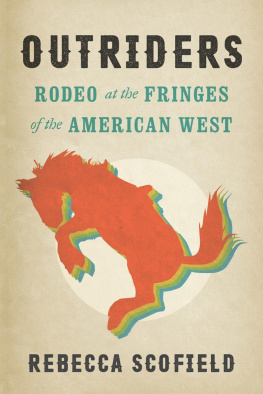
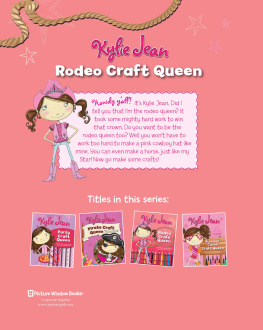
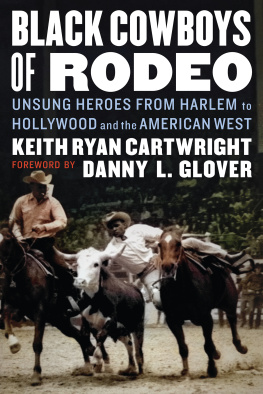

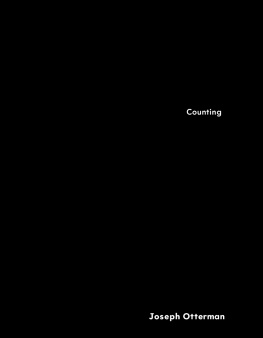
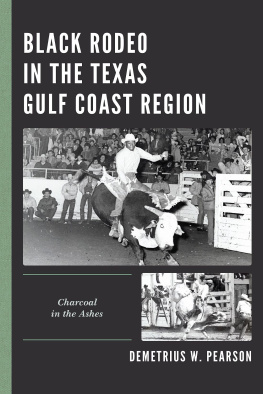
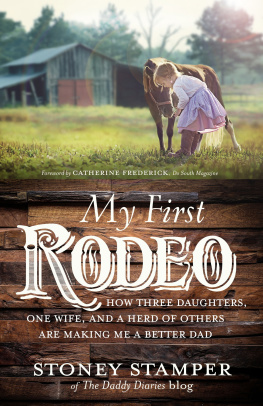
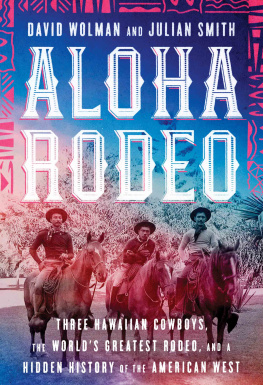
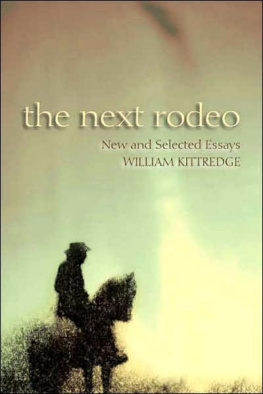
 The paper used in this publication meets the minimum requirements of American National Standard for Information SciencesPermanence of Paper for Printed Library Materials, ANSI/NISO Z39.48-1992.
The paper used in this publication meets the minimum requirements of American National Standard for Information SciencesPermanence of Paper for Printed Library Materials, ANSI/NISO Z39.48-1992.